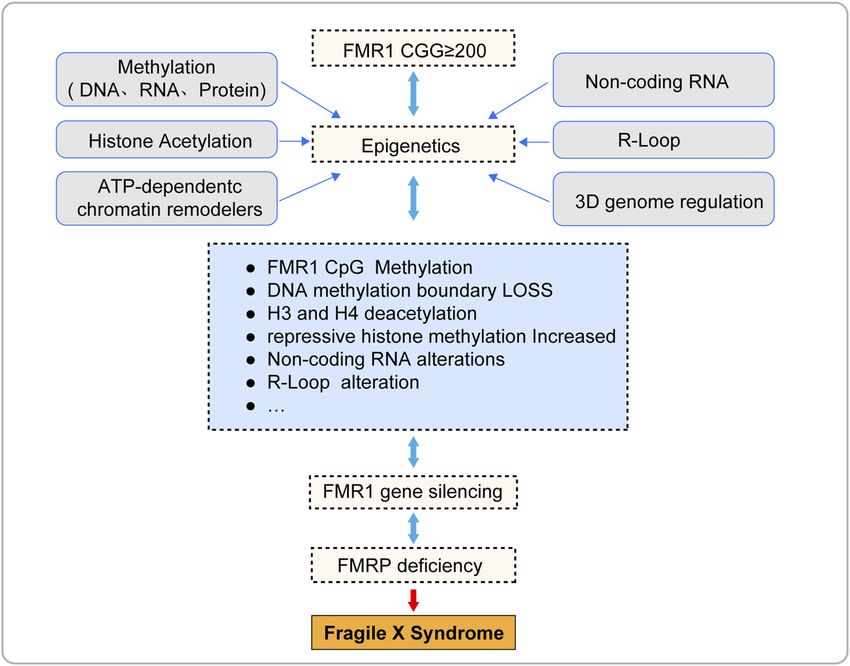- Home
- Resource
- Disease Diagnosis
- Genetic Diseases
- Standardized Diagnostic Approaches for Fragile X Syndrome (FXS)
- Home
- IVD
- By Technology Types
- By Diseases Types
- By Product Types
- Research
- Resource
- Distributors
- Company
Fragile X syndrome (FXS), the most common inherited cause of intellectual disability and autism spectrum disorders, requires precise genetic testing for accurate diagnosis and family management. This resource delves into the pivotal diagnostic approaches revolutionizing FXS testing, ranging from established gold standard methods to emerging in vitro diagnostic (IVD) technologies.
Fragile X syndrome (FXS), the most common inherited cause of intellectual disability and a leading genetic contributor to autism spectrum disorder (ASD), results from a CGG trinucleotide repeat expansion (>200 repeats) in the FMR1 gene on the X chromosome. This expansion triggers methylation-induced silencing of FMR1, leading to deficiency of FMRP (fragile X mental retardation protein), critical for synaptic function. FXS manifests with developmental delay, behavioral challenges, and physical features.
 Fig.1 The pathogenesis of fragile X syndrome (FXS). (Xie L, et al., 2024)
Fig.1 The pathogenesis of fragile X syndrome (FXS). (Xie L, et al., 2024)
Fragile X syndrome (FXS) diagnosis relies on standardized genetic testing to detect FMR1 CGG repeat expansions and methylation status, which are critical for accurate classification of full mutations (>200 repeats), premutations (55-200 repeats), and normal ranges (<55 repeats). Three essential laboratory techniques form the backbone of FXS diagnosis:

PCR is the first-line test for FXS screening, rapidly identifying CGG repeat numbers in the FMR1 gene. While cost-effective and scalable, standard PCR may fail to amplify large full mutations (>200 repeats) due to technical limitations, yielding false negatives. Triplet-primed PCR (TP-PCR) improves detection of premutations and full mutations but cannot assess methylation status. PCR remains ideal for population screening and carrier testing but requires confirmation with Southern blot or methylation assays for definitive diagnosis.

Southern blotting is the gold standard for FXS diagnosis, capable of resolving large CGG expansions (>200 repeats) and determining methylation status simultaneously. Its high sensitivity detects mosaicism and differentiates between premutation and full mutation alleles. However, it is labor-intensive, time-consuming (2-4 weeks), and requires specialized expertise, limiting its use in resource-constrained settings. Southern blot remains indispensable for confirming full mutations and guiding genetic counseling.

Methylation-sensitive multiplex ligation-dependent probe amplification (MS-MLPA) and methylation-specific PCR (MSP) offer faster, high-throughput alternatives to Southern blot for assessing FMR1 methylation. These methods identify epigenetic silencing of the gene in full mutations, correlating with disease severity. While less technically demanding, they may miss rare methylation mosaics. These assays are increasingly adopted in clinical labs for their balance of accuracy, speed, and scalability, particularly in newborn screening and large-scale studies.
Recent advances in in vitro diagnostics (IVD) are transforming the detection and management of fragile X syndrome (FXS), addressing long-standing challenges in accuracy, throughput, and clinical utility. These innovations are particularly valuable for newborn screening, carrier identification, and treatment monitoring. Below, we examine four key technological breakthroughs reshaping FXS diagnostics:

Comprehensive fragile X syndrome (FXS) testing plays a pivotal role in clinical genetics by enabling early diagnosis of neurodevelopmental disorders, identification of at-risk carriers, and informed family planning. The clinical applications span three critical areas: newborn screening, carrier testing, and prenatal diagnosis. These approaches collectively address the lifelong implications of FXS while reducing the average 2-5 year diagnostic delay.
At Alta DiagnoTech, we empower laboratories and clinicians with cutting-edge IVD solutions for accurate and efficient fragile X syndrome (FXS) testing. Our product range includes high-performance PCR kits, methylation analysis kits, and comprehensive NGS kits, designed to fulfill our customers' diverse needs. If you have related needs, please feel free to contact us for more information or product support.
Reference
This article is for research use only. Do not use in any diagnostic or therapeutic application.
|
There is no product in your cart. |